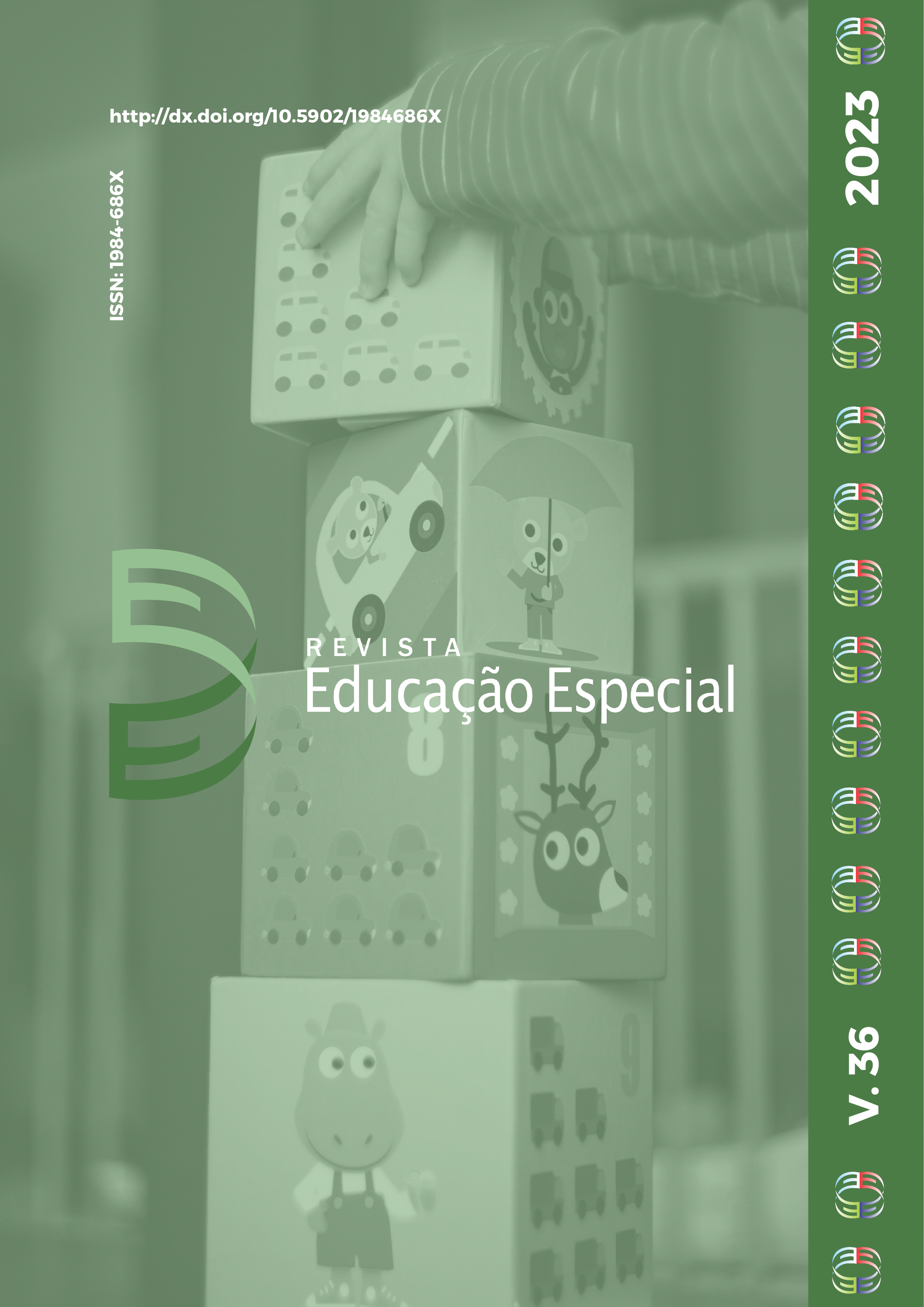The historical-cultural theory as a basis in the constitution of the universal design for learning
DOI:
https://doi.org/10.5902/1984686X84571Keywords:
Historical-cultural theory, Universal Design for Learning, DUA, Inclusive educationAbstract
Universal Design for Learning (UDL) was conceived as a form of curricular reorganization, specifically called differentiation, with the goal of eliminating barriers to learning for all students. It was created with an inclusive perspective where everyone, including people with disabilities, can fully develop their skills and abilities based on three principles: propose changes in the way of motivating and involving students; present the contents and activities in a different way and organize the evaluation of the students in different ways that allow, according to their intelligence, to be able to present what they have learned in a clearer way for them. According to this, in this article in the form of an essay, we intend to discuss the relationship that exists between DUA and the concept of Vygotskyan learning and Vygotsky's historical-cultural theory. To do this, we start from the understanding that this curricular perspective presents the possibility of generating curricula that contribute to the development of all students, disabled or not. This personal development and learning occur, according to the DUA, from relationships in the school context and in the environment, in that subjective and social space of encounter and exchange, which allows them to learn and develop their abilities to the maximum. A concrete form of construction of learning is evident, since it stands out in its guidelines or guidelines, that the curriculum is not a barrier to the construction of their thinking and acting in society, connected with Vygotsky's assumptions, focusing on the elaboration of objects, tools and processes from their zone of proximal development.
Downloads
References
ANACHE, A. A. Aprendizagem de pessoas com deficiência intelectual: desafios para o professor. In: MARTINEZ, A. M.; TACCA, M. C. V. R. (Org.). Possibilidades de aprendizagem: ações pedagógicas para estudantes com dificuldade e deficiência. Campinas: Alinea, 2011.
CAST. Design for Learning guidelines – Desenho Universal para a aprendizagem. CAST, 2011. Disponível em: https://www.cast.org/. Acesso em: 12 set. 2023.
GAGO, L.; ELGIER, Á. Trazando puentes entre las neurociencias y la educación. Aportes, límites y caminos futuros en el campo educativo. Psicogente, 21(40), 476–494, 2018. Disponível em: https://doi.org/10.17081/psico.21.40.3087. Acesso em: 12 set. 2023.
GONZALEZ REY, F. L. Subjetividad social, sujeto y representaciones sociales. Diversitas, Bogotá, v. 4, n. 2, p. 225-243, dez. 2008. Disponível em: http://pepsic.bvsalud.org/scielo.php?script=sci_arttext&pid=S1794-99982008000200002&lng=pt&nrm=iso. Acesso em: 12 set. 2023.
GONZALEZ REY, F. L. Sujeito e subjetividade: uma aproximação histórico-cultural São Paulo: Pioneira Thomson Learning, 2011.
LUSTOSA, A. V. M. F. A expressão da subjetividade no contexto da educa- ção inclusiva: complexidade e desafios. Obutchéne: Revista de Didática e de Psicologia e Pedagogia, Uberlândia, MG, v. 5, n. 1, p. 114-134, jan./abr. 2019.
MADUREIRA, I. Desenho Universal para a aprendizagem e pedagogia inclusiva – sua pertinência na escola atual. In: MENDES, E. G.; ALMEIDA, M. A.; CABRAL, L. S. A. (Org.). Perspectivas internacionais da Educação Especial e Educação Inclusiva. Marília: ABPEE, 2018.
MARIN, M.; BRAUN, P. Currículo e diferenciação pedagógica: uma prática de exclusão? Revista Exitus, Santarém/PA, v. 10, p. 1-27, 2020.
MARTÍN-LOECHES, M. Neurociencia y educación: Ya hemos alcanzado el punto crítico. Psicologia Educativa, 21(2), 67–70, 2015. Disponível em: https://doi.org/10.1016/j.pse.2015.09.001. Acesso em: 12 set. 2023.
MEYER, A.; ROSE, D.; GORDON, D. Desenho universal para a aprendizagem: Teoria e Prática. Wake Field, MA: ELENCO Professional Publishing, 2014.
MEYER, A.; ROSE, D.; GORDON, D. Universal Design for Learning (UDL). Estados Unidos: CAST, 2002.
OCDE. PISA 2012 results. Creative Problem Solving. Paris: OECD Publish. 2014.
REGO, T. C. Vygotsky: uma perspectiva histórico‐cultural da educação. 9ª ed. Petrópolis: Vozes, 2011.
ROTTA, N. T. Introdução. In: ROTTA, N. T.; OHLWEILER, L.; RIESGO, R. S. Transtornos da aprendizagem: abordagem neurobiológica e multidisciplinar. Porto Alegre (RS): Artmed, 2016. p. 3-8.
SEBASTIAN-HEREDERO, E. Diretrizes para o Desenho Universal para a Aprendizagem. DUA. Rev. bras. educ. espec. 26 (4), Oct-Dec 2020. Disponível em: https://doi.org/10.1590/1980-54702020v26e0155a. Acesso em: 12 set. 2023
SEBASTIAN-HEREDERO, E.; PRAIS, J. S.; VITALIANO, C. R. Desenho Universal para Aprendizagem (DUA). Uma abordagem curricular inclusiva. São Carlos. Ed Castro, 2022
STEMBERG, R. Mas allá del cociente intelectual: una teoría triárquica de la inteligencia humana. Barcelona: Desclée De Brouwer. 1995
UNESCO. La educación inclusiva. El caminho hacia el futuro. Ginebra, 2008. Disponível em: https://www.ibe.unesco.org/fileadmin/user_upload/Policy_Dialogue/48th _ICE/General_Presentation-48CIE-4__Spanish_.pdf. Acesso em: 12 set. 2023.
UNESCO. Lucha contra la exclusión. Ginebra, 2013. Disponível em: http://www.unesco.org/new/es/education/themes/strengthening-education-systems/inclusive-education/browse/5/. Acesso em: 12 set. 2023.
VYGOTSKY, L. S. Fundamentos de defectologia. In: VYGOTSKI, L.S. (Org.). Obras escogidas (Tomo V). Moscú: Editoral Pedagógica, 1997
VYGOTSKY, L. S. A formação social da mente: o desenvolvimento dos processos psicológicos superiores. 6 ed. São Paulo: Martins Fontes, 2003
ZERBATO, A. P. Desenho universal para aprendizagem na perspectiva da inclusão escolar: potencialidades e limites de uma formação colaborativa. 2018. Tese (Doutorado em Educação Especial) - Programa de Pós-graduação em Educação Especial, Universidade Federal de São Carlos, Campus São Carlos, 2018.
Published
How to Cite
Issue
Section
License
Copyright (c) 2023 Special Education Magazine

This work is licensed under a Creative Commons Attribution-NonCommercial 4.0 International License.
Declaration of originality
We declare that all articles present in the journal Revista Educação Especial (UFSM) are originals and were not submitted for publishing on any other publication, as a whole or a fraction. We also declare that, after being published by Revista Educação Especial (UFSM), a paper will not be submitted to another journal within two years. After this time, our journal transfers the publishing rights to the authors, with a permit granted by the Editorial Council.
We also acknowledge that the originals’ submission to Revista Educação Especial (UFSM) implies on a transference of copyright for physical and digital publishing to the journal. In case of noncompliance, the violator will receive sanctions and penalties predicted by the Brazilian Copyright Protection Law (n. 9610, dated 19/02/98).







